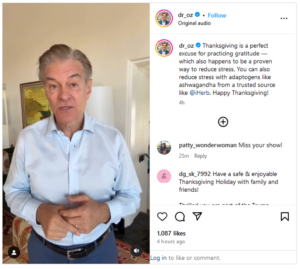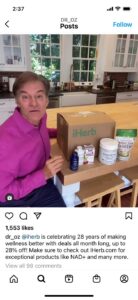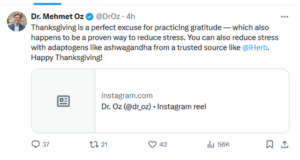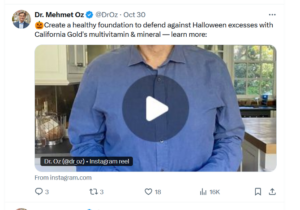Letter to FTC: Investigate Dr. Oz’s Potential Violations of Influencer Marketing Standards
Samuel Levine
Director, Bureau of Consumer Protection
Federal Trade Commission
600 Pennsylvania Avenue, NW
Washington, DC 20580
Dear Samuel Levine:
I am writing to urge the Bureau of Consumer Protection to investigate whether Dr. Mehmet Oz has violated Federal Trade Commission (FTC) policy on undisclosed endorsements and product advertisements (“influencer marketing”) and take appropriate action.
As you know, a longstanding, core principle of fair advertising law in the United States is that people have a right to know when they are being advertised to. With that knowledge, consumers can hopefully apply the appropriate emotional and intellectual filters to advertisements, discounting puffery and claims of authenticity. By contrast, disguised advertisements are inherently deceptive, because consumers do not know to apply appropriate screens. The issue is acute with disguised ads featuring paid endorsements, where deceived consumers believe admired celebrities are making genuine, self-directed and enthusiastic endorsements of brands, not realizing that those celebrities are instead paid and may not even use the touted brand.
Public Citizen has long been concerned about the issue of undisclosed product advertisements, particularly in the era of social media and influencer marketing, where everyone from neighbors to celebrities may be paid to promote products and services in their social media feeds. In 2016, with colleague organizations, we highlighted dozens of cases of undisclosed influencer marketing, leading to more than 90 notices from the FTC to influencers.
The FTC has elucidated clear standards for endorsement disclosure in its endorsement guidelines. The guidelines are clear that endorsement disclosures must be made in every promotion, not just generically. Specifically, if a person is using their social media account to promote a product or service in exchange for compensation, they must note the paid relationship in social media post, not just in their biography. From example 9(i) of the endorsement guidelines:
An influencer who is paid to endorse a vitamin product in their social media posts discloses their connection to the product’s manufacturer only on the profile pages of their social media accounts. The disclosure is not clear and conspicuous because people seeing their paid posts could easily miss the disclosure.
The logic of this rule is clear: Because most people will miss the disclosure in the profile page, that disclosure does not adequately inform consumers and enable them to contextualize the advertisement they are seeing as an advertisement.
The agency’s “Disclosures 101 for Social Media Influencers” – a plain language presentation of the guidelines — makes the rules and rationales very clear:
The disclosure should be placed with the endorsement message itself.
Disclosures are likely to be missed if they appear only on an ABOUT ME or profile page, at the end of posts or videos, or anywhere that requires a person to click MORE.
Don’t mix your disclosure into a group of hashtags or links.
If your endorsement is in a picture on a platform like Snapchat and Instagram Stories, superimpose the disclosure over the picture and make sure viewers have enough time to notice and read it.
If making an endorsement in a video, the disclosure should be in the video and not just in the description uploaded with the video. Viewers are more likely to notice disclosures made in both audio and video. Some viewers may watch without sound and others may not notice superimposed words.
Dr. Mehmet Oz is a well-known television personality and was the host of long-running, health talk show, “The Dr. Oz Show.” President-elect Donald Trump has announced plans to nominate Dr. Oz to serve as administrator of the Centers for Medicare and Medicaid Services.
Dr. Oz is the global advisor for iHerb, an herb and supplement company.
Dr. Oz maintains a robust social media presence. He has 1.1 million followers on Instagram and 3.7 million followers on X/Twitter. In his profiles on these platforms, Dr. Oz discloses that he is “@iHerb Global Advisor & Stakeholder.”
However, Dr. Oz posts regularly with appeals to consumers to consider buying products from iHerb. Video posts do not disclose his financial connections, nor does the accompanying text. Nor do the posts contain other disclosures such as #ad.
In our review of Dr. Oz’s social media feed, we found that he cross-posts content among various platforms, in no case making the disclosures on Instagram or X/Twitter required by the FTC’s Endorsement Guidelines and fair advertising law principles. The most recent example comes from the day before Thanksgiving.
Notably, Dr. Oz’s posts on TikTok, where he has 1.1 million followers, do contain disclosures, though it is not clear if they sufficiently disclose Dr. Oz’s interests. Those posts contain direct links to make purchases from iHerb and a disclosure that the “creator earns commission.” These disclosures are likely automated by TikTok’s content disclosure system.
We have pasted screenshots of relevant posts from Instagram and X/Twitter in an appendix to this letter.
Thank you for your consideration of this issue.
Sincerely,
Robert Weissman,
Co-President, Public Citizen
APPENDIX: SCREENSHOTS OF PROFILES AND POSTS FROM DR. MEHMET OZ’S SOCIAL MEDIA FEEDS







X/Twitter




